At 84 years of age, he is easily the oldest marathoner in Singapore – and his aim is to complete 100 marathons before he considers even slowing down. In fact, he has finished a massive 98 marathons – and is still going strong.
I caught up with Chan Meng Hui, who works as a Logistics (courier service) supervisor and asked him about his 100-marathons goal, as well as how he stays injury-free. I also got some tips from this cheerful and talkative runner on running marathons.
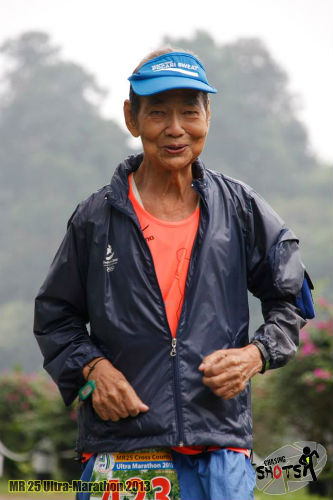
Chan Meng Hui tackling the MR25 Ultra Marathon 2013. (Reproduced with permission from Chan Meng Hui)
Read on, to find out what this amazing veteran marathoner said, in an interview I had with him.
Meng Hui, why do you want to run 100 marathons?
I had already done 92 marathons when I came up with this goal. So 100 sounded like a very logical number – to finish up my marathon “career” with.
When do you run your 100th marathon?
My target was to run StanChart at the end of the year. But I belong to club MR25, and the chairman want me to run for them at the MR25 marathon this year in June. My running “career” was born at MR25, so I have to complete my 100th marathon with MR25.
What is your personal best timing for a marathon?
My best marathon time was 3hours and 26minutes at the Kuala Lumpur marathon.
For that, I trained very hard and clocked almost 100km per week at least six months prior to the race. I was 57 years old at the time and trained for that marathon for about two years.
But now that I am 84 years old, I tell people not to ask me about timing. Instead, ask me whether I can cross the finishing line.
What are your race tactics?
For the first half of the marathon, the body needs to warm up. In the second half, you can then cut through a lot of people. Many people have no experience and start out the marathon very fast. But after five kilometres, they start walking because they are too tired. For me, I start the marathon at the very back of the pack. Then when my body has heated up, I will slowly pick up the speed and cut in front of people – one by one.
The day before the race, have a good rest too and consume enough liquids.
What is your main secret to staying so fit and active?
The secret is to exercise and even the government is now promoting exercises and healthy living too. You need not do running though – you can do housework or gardening. Anything that can keep you active is good. Once you exercise, your blood circulation goes straight to your brain and you will benefit.
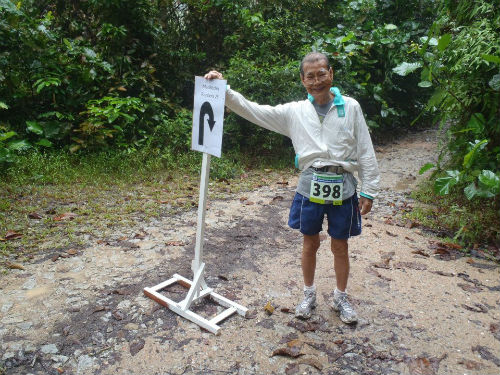
Proudly posing at the U-Turn point at the MR25 Ultra Marathon ’13. (Reproduced with permission from Chan Meng Hui)
What is your typical diet like?
I have five or six small meals a day. For every meal, I eat until I am 70% full and save the other 30% for the next meal. If your tummy is too full, you will feel lazy. Your body needs to digest the food. So you should eat less – but eat more often.
My last intake of food is usually just before I go to bed. This is one cup of tea and two biscuits. That is considered as one meal. In the morning, I take two egg whites and some porridge because it is easy to digest and it prevents the internal organs from having to do more work. You will feel hungry soon after, but you can have another meal later.
How do you usually train for a marathon?
By going for long distance runs and just accumulating my mileage.
If you want to do an eight-hour marathon, you don’t really need to train properly. You will still have to accumulate enough mileage to finish the race though, but you can take your training a lot more slowly and stop to rest whenever you feel pain. But you should train enough to get the muscles used to covering such a long distance.
How did you get interested in running marathons?
During my time, it was compulsory retirement at 55.
When I retired, I went to China for a holiday. I saw some people there who looked about 80 to 90 years old but they seemed quite healthy. So I asked the old people how they did it. They said that they exercise and keep their bodies moving.
So I realised that if I wanted to have a good quality of life, I had to exercise and change my partying and sedentary lifestyle.
My weight then, was also its heaviest, at 65kg when I retired, and I looked about 70 when I was only 55 years old. So I decided to run. Initially, I could not even run 200m – before my heart started panting.
After a few months, I improved to 400m and then 1km and eventually 5km. I realised at that point that I like running. I also lost weight – I am about 52kg now.
Why do you like running?
Running helps me to make a lot of friends. Many people know my name and they often call out to me – even though I don’t know them. This makes me happy.
You also only need to have a pair of shoes too, for running. Moreover, you don’t need to find someone else to run with you – unlike say, in badminton, where you would need to find a companion to play with.
For running, you can go anywhere and run anytime you want, too. After work, for example, you can just whip out a pair of running shoes to run wherever you feel like.
How often do you run overseas?
My latest overseas marathon was the Myanmar one in January this year. Before that, I did a marathon in Shalom, Sri Lanka last December. Earlier on, I used to run overseas every two to three months.
Are there any marathons that you have not managed to complete?
One race I did not complete was the Berlin Wall marathon – running from East Berlin to West Berlin. It’s not that I could not run, but I took too many pictures along the route and I was too far behind. I was the last runner, as a result.
They had a sweeper bus that picked up the runners who were too slow, because the road needed to be re-opened. But I tried to be stubborn and whenever the sweeper bus came near, I picked up my pace and tried to run faster. But it eventually caught up with me at the 38km mark and I was picked up to go to the finish line.
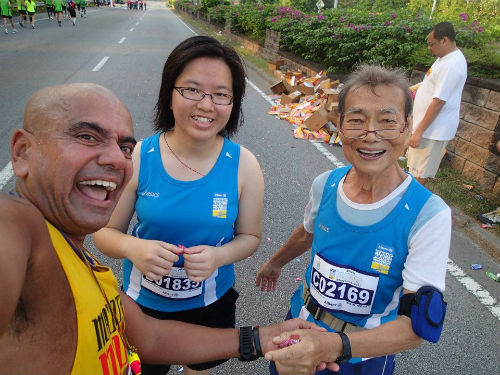
Meng Hui (far right) and a group of friends taking a selfie at the Penang Bridge International Marathon! (Reproduced with permission from Chan Meng Hui)
What is one marathon that you remember fondly?
One such race was in Mongolia. It was a very mountainous course, where they used horses as ambulances. The officials and assistants will ride one horse and pull the other. The spare one is the ambulance. That was quite interesting.
This marathon also had no markers to indicate the distance that runners have completed – unlike at most marathons.
One thing good about the Mongolian race was that every station had a checkpoint where they will mark everyone’s attendance. For example, if there were 50 runners altogether and only 40 crossed the checkpoint, they will send a horse out and try to search for the other missing 10 runners. If they were missing someone, they will really go out into the jungle and search for them. One of my Singaporean friends went off-course and got lost, so they actually mounted a full-scale search for him for more than an hour.
And at night, we even stayed in tents in the jungle – not in houses. To keep warm too, we had to go outside and get dry leaves and branches to burn for heat – an amazing experience.
What were two of the toughest marathons that you have done?
One was the Great Wall of China marathon because there are so many steps that you have to climb – in order to reach the top. I found that a real challenge.
The Hokkaido marathon in Japan was also tough. It was really cold there and the winds were extremely strong. These were blowing towards the mainland and not out to sea, so at one stage, I had to look for a big tree and hug it for a while to wait for the winds to dissipate a bit before I could continue running. That was definitely a huge challenge for me.
What do you look for, when deciding on a race to enter?
I will take note of what the cut-off time is and whether they will wait for the last finisher. For example, in KL, they will wait for everyone to finish. There will be some officials still there to wait for the last runner to finish and they will take your timing manually. That is important to me.
What is your secret to staying injury-free when running?
I have actually been quite lucky in terms of injuries. Despite my age, I have had no knee and any other problems related to running. These are my secrets:
I listen to my body
If there are problems, your body will tell you – and you must stop running. For example, if you are very tired or are sweating more than usual, your body is trying to tell you something, so you must stop. Many people collapse and die during races because they push too hard.
Take rest breaks during races
During races if I am feeling more tired than usual I will stop and rest. I will wait for my heartbeat to go down and then start again. I practise this method all the time and so far, I have been quite safe.
Avoid hard surfaces
Do not run too often on a hard surface.
During races, road surfaces are unavoidable, but when you are training, try to do so on soft surfaces and avoid hard ones because they are very bad for your joints. Soft grounds in Singapore would include the seaside, stadium running track and the cross-country trails.
Get a good pair of shoes
Getting a good pair of cushioned shoes also helps to prevent injuries because the shoes can absorb some of the running impact. This is important for my joints and kneecaps.
Get adequate rest
For running, rest is also very important. I run six days a week and make sure I have one day of rest every week. If you rest, your body can run better the next day. If you feel that a single day of rest is not enough, try resting for two days because running every day will cause your body to wear out.
What does your family think of your running?
They think I should not be running. For example, my second son keeps on telling his mother to ask me not to run. He thinks that I should just stay at home because I am 84 and too old to run.
Do your other family members run too?
My oldest son does not like running. He says that running is a form of suffering.
For my second son, he likes to run but he is always so busy and has no time.
But he did take part in a marathon with me once and made sure that I completed the race – by accompanying me.
What tips can you share with readers for doing marathon races?
Many people ask me how I do marathons. It is simple – you just need to keep running.
For an eight-hour target, I will do the race with a run-walk strategy. For example, if the race has lampposts, I will run past post numbers one and two and walk through numbers three and four and so on until I have finished. Sometimes if the event does not have any lampposts, I will use trees – as markers instead.
For a person to do a full marathon in about four or five hours, you will need to build up your mileage. For example, to run a 4-hour marathon, build up mileage per week to about 80km. One day you run 10km and the next day you rest. The third day you run 10km again, and incorporate a 30km run into your training.
How would you advise an older person who wants to pick up running?
Slowly build up mileage
They should ask themselves if their body is able to take it. If not, they should do other exercises that have lesser impact on the joints. But if they still want to run, then slowly build up their mileage. Do not go straight away to run. For many newcomers, they run a very good timing for their first marathon because they do not know the difficulties and want to take on the challenge. But by the second one, they don’t want to run anymore, because they find that it is too tough to do it again.
See a doctor
For older people, it is very important to see a doctor to have a check-up and see if your body can do this. Many people have collapsed during races because they did not have a proper check-up and may have had hidden problems that they were not aware of.
Let the lactic acid go away
Another thing is that after running you should not sit down. You should walk about and let the lactic acid go away. Otherwise, this will build up and you will suffer painful cramps. Once you cross the finishing line, just walk.
Suck in oxygen
When you feel tired too, you should open your mouth, suck in the oxygen and breathe out slowly. Then repeat a few more times and you’ll find you can run more efficiently.
To read more about this inspiring marathon runner, check out his book, “Run For Life” by Chan Meng Hui, one of Singapore’s oldest marathoners – available at most major bookstores.
Read more on Uncle Chan
Click here to read about Uncle Chan’s 101st marathon @ SCMS 2015.
Click here to read about Uncle Chan 100th marathon at SCMS 2014.
Chan Meng Hui: Running For Life

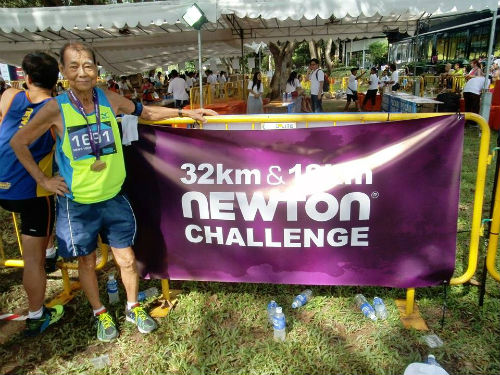
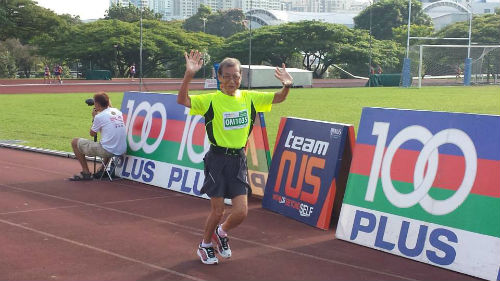

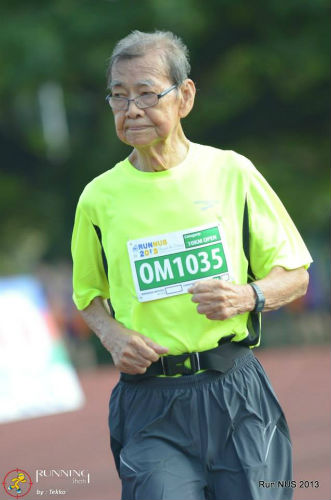
Leave a Comment